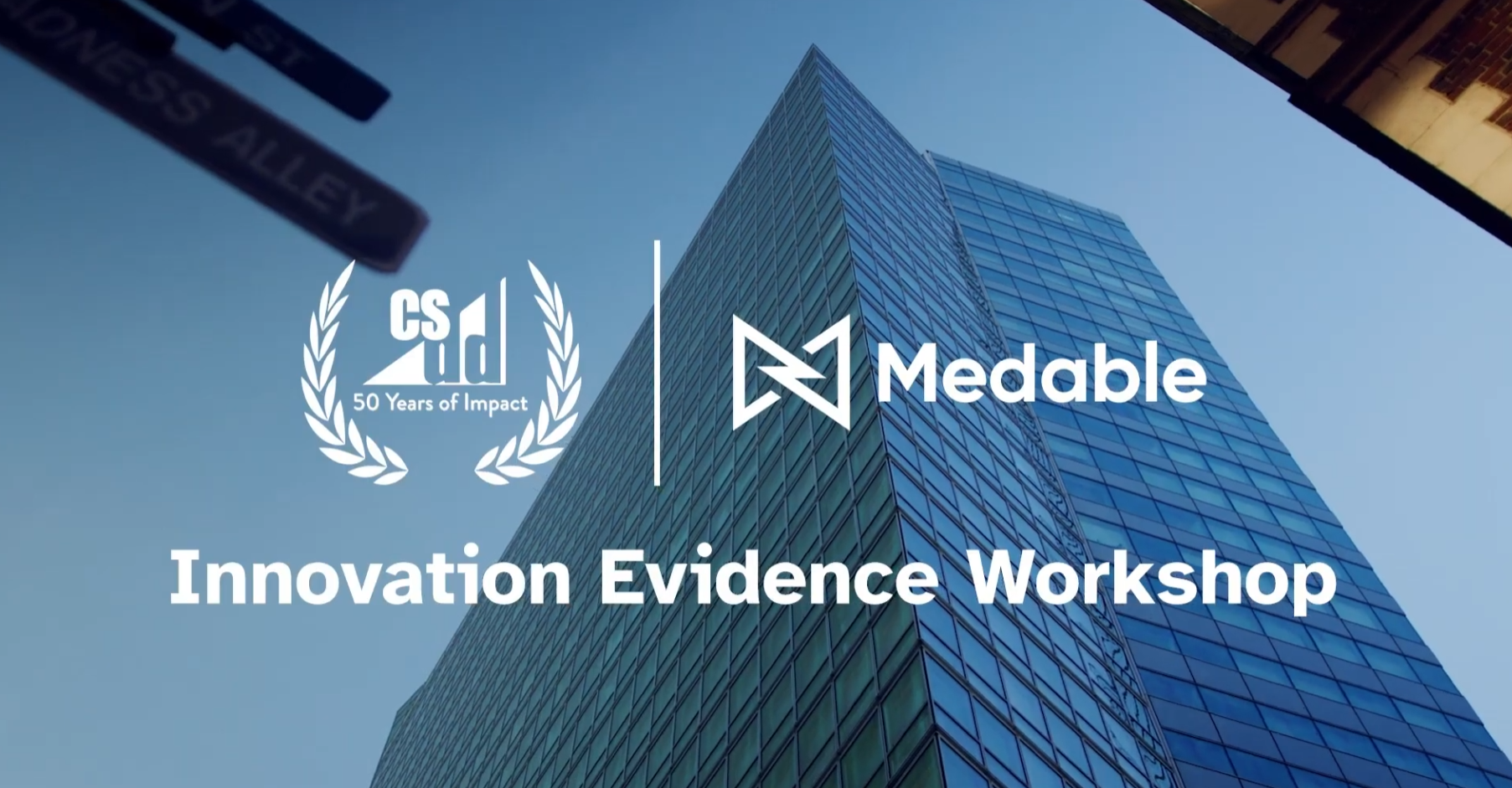DCT


Innovation Evidence : A Tufts CSDD workshop
In the five years since the pandemic, decentralized trial elements have solidified their status in medical product development.
Trials with decentralized elements have moved past the “pilot” phase. The question is no longer whether we can operationalize decentralized trial components, it's whether we’re doing it thoughtfully at the pace patients deserve. Our industry is ready to optimize the elements for the trial based on available evidence.
That’s exactly why Medable, in collaboration with and facilitated by the Tufts Center for the Study of Drug Development (Tufts CSDD), has launched the Innovation Evidence Workshop series.
Last November, the inaugural, invitation-only workshop brought leaders from 20 pharmaceutical, biotech, and CRO organizations together in Boston, with representation from the U.S. Food and Drug Administration, Harvard MRCT Center, Tufts CSDD, and Medable.


Back to basics: Agentic AI and how it’s impacting clinical trial research
Since the release of OpenAI’s ChatGPT in 2022, the buzz around artificial intelligence has been impossible to ignore. From advertisements during the SuperBowl to webinars and working groups, the impact of artificial intelligence has been felt in almost every sector of our world.
But, what if we told you the most transformative shift is still on the horizon?
When ChatGPT first released it changed the way the world, including clinical research, worked. Now NVIDIA, one of the most premier companies leading the way in the development of AI, has stated that they expect the development of Agentic AI, a new type of artificial intelligence to “change the way we work in ways that parallel how different work became with the arrival of the internet.”
This means agentic AI may have a much bigger impact than even generative AI did years back.
So, if you’re curious about agentic AI, read on as we delve into its nature, differentiate it from generative AI, and reveal its transformative role in clinical research."


The Top 5 myths about eCOA in 2025
With MarketsandMarkets projecting the global electronic Clinical Outcome Assessments (eCOA) solutions market to grow at compound annual growth rate (CAGR) of 16.1% each year until 2030, it’s clear the eCOA has made its impact within the clinical research landscape.
Yet despite growing adoption, electronic Clinical Outcome Assessments (eCOA) are still surrounded by misconceptions that hinder their full potential. From concerns about patient usability to assumptions about cost and implementation timelines, these myths can create hesitation among sponsors and research teams alike.
Thus, we’re here to cut through the noise and set the record straight with a summary of a recent webinar featuring speakers from Transcelerate and Medable.


What is eCOA? An overview of eCOA in Clinical Trials
What is eCOA?
As FDA Principal Deputy Commissioner Janet Woodcock said in a 2015 Clinical Outcome Assessment Public Workshop, “It turns out that what is really bothering the patient and what is really bothering the doctor can be radically different things...patients are true experts in their disease.”
Clinical outcome assessments (COAs) have been key to capturing a comprehensive picture of patient experiences and treatment outcomes in today’s research landscape for decades. Integrating COAs into trial protocols bolsters our treatments' scientific integrity and enhances our ability to understand the real impact of interventions on patients.
COAs (called eCOAs when captured electronically) are essential to understanding whether a drug reduces symptoms, improves patients’ quality of life, and improves their ability to perform activities they care about.
Since the mid-2010s, electronic clinical solutions, like eCOA, have rapidly replaced their paper counterparts. Electronic Clinical Outcome Assessments comprise systematized digital methods for capturing patient-centered outcomes in clinical trials. These systems utilize validated electronic interfaces to collect, store, and analyze patient-reported data, clinician observations, and performance metrics.


DTRA 2024: GSK and Medable discuss change management and DCTs
On Friday, November 15, 2024, the Decentralized Trials & Research Alliance (DTRA) held a fireside chat between Brandon Maggio, GSK’s Global Head of Digital Operations & Process Optimization, and Alison Holland, Medable’s Chief Customer Officer. They were gathered to discuss the evolving landscape of decentralized and digital clinical trials and how best to drive change management in an era of continual changes within trial research. The following blog is a summary of their discussion.


Challenge fuels change: Medable impact report
Medable’s 2024 was a year of exceeding key milestones and helping our customers reach new heights.
Take a look at the difference Medable has made with our year-end impact report.


The Future of decentralized clinical trials: Opportunities and adaptations for Medable
Traditionally, clinical trials have relied heavily on centralized sites and face-to-face interactions between researchers and participants. However, the limitations of this model have become increasingly apparent, especially during the COVID-19 pandemic, which prompted an unprecedented emergence of decentralized clinical trials (DCTs), whose characteristics of remote patient engagement, virtual assessments, and mobile health technologies allowed the healthcare industry to continue drug development (albeit at a slower pace). As the healthcare landscape continues to evolve, DCTs are emerging as a vital component of the clinical research ecosystem. By leveraging technology and data to streamline processes and the need to enroll a greater diverse patient population, DCTs promise enhanced patient engagement, improved data quality, and accelerated study timelines. As with everything in life, nothing is always that simple. In this blog, we will explore the future of decentralized clinical trials and look at the challenges faced by sponsors, sites, and patients when planning, implementing, and running a DCT. We will also discuss how Medable is continuously adapting its platform and software capabilities to reduce risks and provide solutions that allow the benefits of DCTs listed above to be fully realized.
.webp)

Rapid evolution: Clinical trials have gone digital
DCT and digital elementsare now the new normal. But what exactly does "digital" or "decentralized" mean in the context of clinical trials?
A panel of industry experts from Sanofi, Bayer, and the Clinical Trials Transformation Initiative (CTTI) recently came together to discuss the evolution of DCTs and share their experiences.


Last Year’s DCT Is Today’s Clinical Trial
DCTs have transformed from a disruptive force challenging the norm to an integral concept, now widely embraced in the clinical trial landscape. Join us for this upcoming Clinical Leader Live session, where experts will explore the current landscape, highlighting the positive impact of DCTs and their transition from innovation to indispensable practice in the era of evidence generation and modern clinical trials.


Ethical Review of Decentralized Clinical Trials (DCTs): Tools, Resources & Best Practices
Industry experts from Medable and Harvard School of Medicine discuss how to equip your future digital/decentralized trial IRB & ethics submissions for success.





